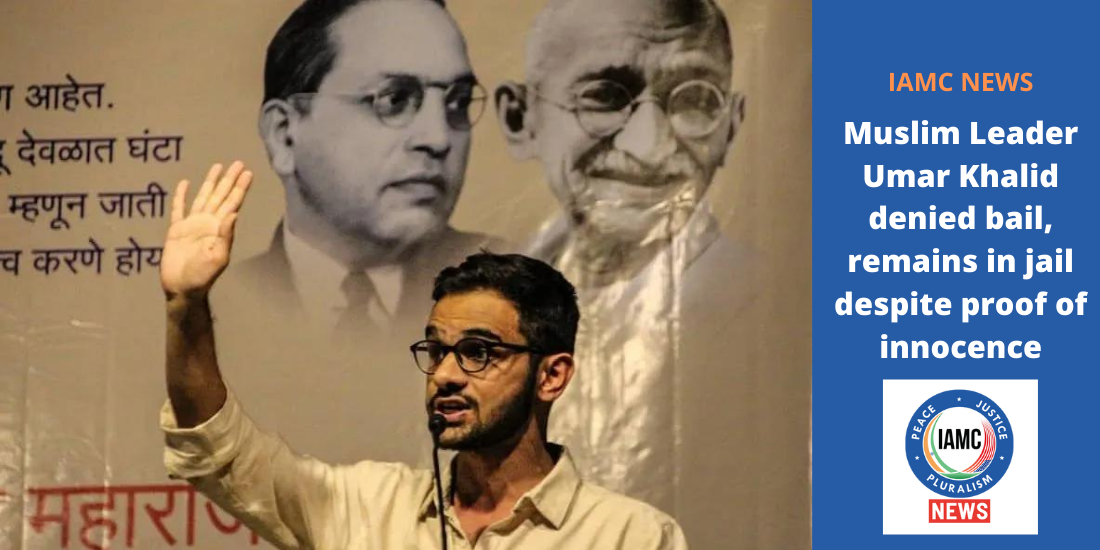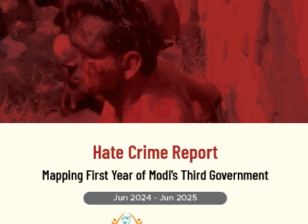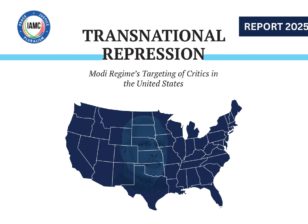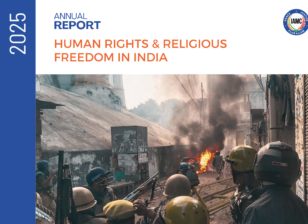Muslim Leader Umar Khalid denied bail, remains in jail despite proof of innocence
“At one point, the police admitted that they did not even have a full recording of the speech given by Umar Khalid, a prominent human rights defender and a youth leader, and had only seen a short video clipping of his speech. In fact, the full recording of his speech established that Umar Khalid had explicitly eschewed violence and asked the protesters to follow Mahatma Gandhi’s path of nonviolence.”
IAMC News Desk
Washington, D.C.
Renowed Muslim leader and activisit Umar Khalid has once again been denied bail by the Delhi Court. Khalid remains behind bars two years after he was falsely accused of leading violent clashes that killed 53 people, mostly Muslims in February, 2020. Khalid is being targeted for his criticism of the Modi government & its discriminatory policies.
In a Congressional Briefing organized by the Indian American Muslim Council (IAMC) alongside a coalition of 18 organizations, Dr. Mike Ghouse spoke on the Indian Police Service and its carrying of false cases against Muslim leaders such as Umar Khalid and Khalid Saifi despite independent investigations proving their innocence. Ghouse is the founder-president of the Center for Pluralism, an international center for research. He is also the Director at World Muslim Congress, a think tank. He is committed to building cohesive societies and offers pluralistic solutions on issues of the day.
Below are Dr. Ghouse’s detailed remarks on the Khalid and Saifi’s cases, and the shocking lengths the Indian Judiciary has gone to ensure that justice is not served.
“In the Delhi riots case, the behavior of the judiciary, all the way up from the trial court to India’s supreme court, has not inspired confidence in the autonomy and independence of the judiciary.
In this case, the Indian police in the national capital of New Delhi are pursuing an utterly false case against Muslim leaders such as Umar Khalid and Khalid Saifi who have been arrested on fake charges of carrying out the violence in February 2020. It has been repeatedly established through independent investigations, including by Amnesty International, that that violence was actually carried out by Hindu extremists with the full support of and participation from uniformed personnel of Delhi Police.
That violence had occurred in Northeast Delhi, while US President Donald Trump was visiting the Indian capital. As is widely known, the violence started shortly after Kapil Mishra, a leader of the Bharatiya Janata Party which rules India, openly threatened violence against Muslims and others who had been protesting against the Citizenship (Amendment) Act whose aim is to disenfranchise Indian Muslims and rob them of their citizenship.
This issue, in fact, reached the courts even as the fires were raging in New Delhi. Hearing an urgent plea, Justice S. Muralidhar and a fellow judge of the Delhi High Court ordered the Delhi Police to immediately register a case against BJP leader Mishra and investigate his role in the violence. That very night, in a matter of hours, judge Muralidhar was transferred out of the high court. No explanation was given by India’s Supreme Court as to why he was transferred in such a hurry.
Within days, the replaced judges of the high court canceled Justice Muralidhar’s order to the police to file a First Information Report, or FIR, against BJP leader Mishra and others. To this day, Mishra has not been investigated and the police have not filed a case against him. Emboldened by the court’s response, the Delhi Police eventually filed false criminal cases against Harsh Mander, a globally renowned Indian human rights defender who has recently been nominated for the Nobel Prize, and who had been the petitioner seeking police action against BJP leader Mishra.
In passing his order on BJP leader Mishra, Justice Muralidhar had viewed video clips of the speech that Mishra had made openly threatening violence. Incredibly, while India’s solicitor general, who is the country’s senior most government lawyer, agreed that Mishra’s speech was inflammatory, he told the court that it was not a “conducive time” to file the FIR. This when the police had already registered nearly a dozen FIRs against others, including Muslims, falsely accusing them of the violence.
What is even more shocking is that when family members of those killed in the violence by Hindu extremists brought their case before the then Chief Justice of India, S. A. Bobde, he refused to take any action either to stop the violence or to order police action against the instigators of the violence, including BJP leader Mishra and BJP parliamentarians Pravesh Verma and Anurag Thakur. Shockingly, he said the Supreme Court was “not equipped to handle… that kind of pressure. We cannot stop things from happening. We cannot give preventive reliefs. We feel a kind of pressure on us.”
All the BJP leaders have continued to walk free. On the other hand, hundreds of Muslims continue to be in prison on absurdly false charges of carrying out the violence against their own community.
As the trial wound up in the lower court since 2020, it became increasingly clear from the proceedings that the police had done an extremely shoddy job. At one point, the police admitted that they did not even have a full recording of the speech given by Umar Khalid, a prominent human rights defender and a youth leader, and had only seen a short video clipping of his speech. In fact, the full recording of his speech established that Umar Khalid had explicitly eschewed violence and asked the protesters to follow Mahatma Gandhi’s path of nonviolence.
It also became clear that the trial judge, Vinod Yadav, was a no-nonsense judicial officer who would not cut the police any slack. One day he had had enough, and he openly chided the police in the courtroom calling the police investigation “callous and farcical” after a policeman deposing in the court as a witness failed to identify three alleged rioters. He said the failure of the police to conduct a proper investigation would torment the “sentinels of democracy”. The judge was incensed that the policemen were “lying on oath” and giving contradictory statements. He said: “This is a very sorry state of affairs.”
The judge’s exasperation had in fact been building up for months. At one time, he had said that the standard of investigation in a large number of 2020 northeast riots cases was “very poor” and will be “remembered for police failure.” Once he also imposed a fine of Rupees 25,000 on a police officer, saying the “police have miserably failed in their statutory duties.” The Delhi High Court promptly stayed the imposition of that fine.
At another time, judge Yadav observed that the police investigation displayed a “complete lack of supervision” and was being led in a manner so as to “protect the accused.” He also gave bail to a Muslim man who was accused of joining a Hindu mob and killing Muslims. “It is very obfuscatory that a Muslim boy would become part of an ‘unlawful assembly’ which mostly consisted of members of the Hindu community, the common object whereof was to cause maximum damage to the property, life and limb(s) of the other community,” he wrote.
After his last observation that the police case was casual, callous and farcical,” judge Yadav was transferred within 24 hours and replaced. This decision was taken by the chief justice of the Delhi High Court, without so much as an explanation why he would decide to move a judge in such a sensitive case right in the middle of the hearings.
The new judge, Amitabh Rawat, has since then been speaking much more favorably for the police. This week he denied bail to two of the accused, Muslim civil rights activists, saying that prima facie he believed the allegations against them were true. He has maintained that line from the day he was assigned to the case over a year ago, saying that “prime facie the allegations are true.”
And how did he arrive at that decision? Judge Rawat said that the protesters had intentionally blocked roads, which caused inconvenience and disrupted supply of essential services. Therefore, their protests qualified to be prosecuted under the draconian anti-terror law, the Unlawful Activities (Prevention) Act (UAPA). “The provisions of UAPA have been rightly invoked in the present case,” he added.
Incredibly, while the judge has kept saying that the charges are prima facie true, he has refused to allow the defense to discuss the evidence saying that can only be done at the time of the trial. A major part of the prosecution’s evidence is WhatsApp chats among the accused. The police say the accused were in control of the protests, and therefore they incited the violence. The judges says, yes, that seems to be prima facie true on the basis of the WhatsApp chats. But when the defense says that nothing in that WhatsApp chat shows that they incited or talked about violence, the judge says, wait a minute, we cannot discuss this yet because the trial isn’t over yet.”
[This coalition of 18 organizations holds congressional briefings every alternate Wednesday. Its members are: Amnesty International USA, 21Wilberforce, Hindus for Human Rights, Indian American Muslim Council, World Without Genocide, International Christian Concern, Jubilee Campaign, Dalit Solidarity Forum, New York State Council of Churches, Federation of Indian American Christian Organizations of North America, India Civil Watch International, Students Against Hindutva Ideology, Center for Pluralism, American Muslim Institution, International Society for Peace and Justice, Association of Indian Muslims of America, and the Humanism Project.]




